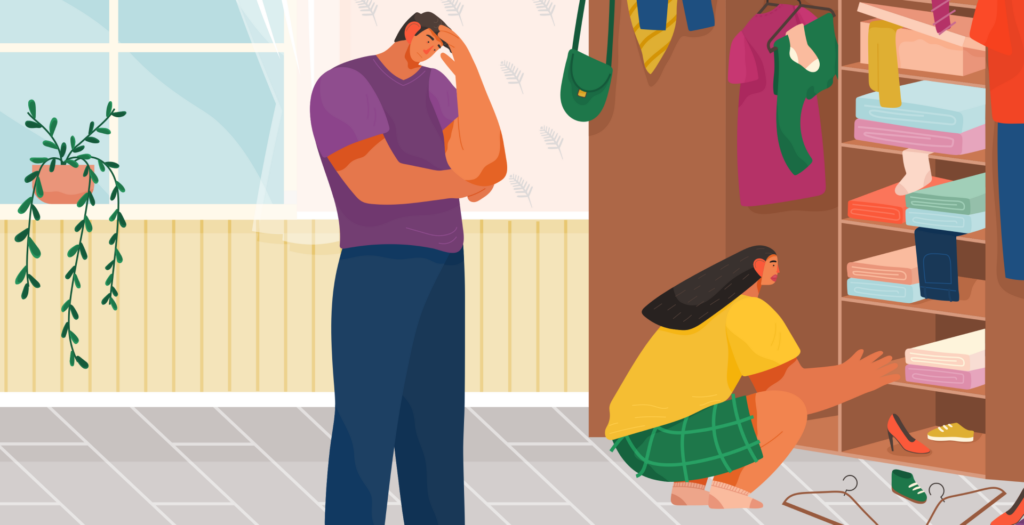While, theoretically, we could share his obligations with the other half
One might expect that when we start sharing our lives—and our homes—with a man, we also share household chores, and the time we spend on them decreases, right? Wrong. According to an American study by the Gender Equity Policy Institute, women in heterosexual relationships actually spend more time on housework than single women.
On the other hand, the amount of time men spend on household tasks remains roughly the same, regardless of their family status—and in any case, it is less than that of women. For example, mothers with a high school diploma or lower education spend 19 hours per week on house cleaning and childcare, while men with similar education levels spend only 7 hours per week. The fact that same-sex couples tend to divide household responsibilities more equally confirms that gender stereotypes and biases are still deeply rooted.
In the past, even though women were more attached to traditional roles, the rapid advancement of technology seemed to promise a better future—one where robots would take care of cooking and ironing, allowing women more free time for self-care or hobbies. What actually changed, however, is that our homes have become filled with even more objects that need to be cleaned, vacuumed, dusted, polished, ironed, dried, and folded, as highlighted in an interesting new article from The Atlantic titled Put Down the Vacuum.

Social media hasn’t made things any easier either. While it offers hacks—like faster ways to remove stubborn stains from clothes—it also encourages us to buy even more white shirts (which we then have to wash, hang, iron, and fold) and to clean every corner of our homes with even greater precision. Especially after the pandemic, one doesn’t need to be a germophobe to obsessively scrub the floors. The next square inch might be harboring the latest strain of the coronavirus.
The issue of dismantling stereotypes concerns both sides. It’s not enough for men to stop treating laundry as a threat to their masculinity. It’s equally important for women to accept that our homes don’t need to sparkle with cleanliness 24/7 or be organised according to every principle of Marie Kondo (to be fair, even she threw in the towel once she became a mother).
Perhaps, at least in this case, we should take a cue from the more relaxed male approach, as highlighted in an experiment where researchers asked volunteers to give a video tour of their homes. Almost all the women apologised for their rooms not being in “perfect condition,” while the men, walking through the same spaces, made no mention of any mess whatsoever, as noted by expert Jeanne Arnold.
However, according to another experiment by sociologists Sarah Thébaud, Leah Ruppanner, and Sabino Kornrich, when it comes to other people’s homes, men are just as observant—and perhaps just as critical. Volunteers were asked to rate various homes based on their cleanliness and organization, and the assessments were roughly the same across genders.

Even more interesting was a second experiment in which participants evaluated rental listings on platforms like Airbnb. Some of these listings were hosted by “John,” while others were listed under “Jennifer.” The spaces rented by “Jennifer” were rated more harshly.
While the gender gap in housework may be narrowing as younger generations spend more time on childcare and household tasks, there is still a long way to go—especially as long as men continue to expect a standing ovation for doing the dishes while women still beat themselves up with guilt for not wiping down the kitchen counter.
Some key takeaways from the American article? Recognise that the flawless images on Instagram are not realistic benchmarks unless you have an army of household staff and the best editing tools—in fact, they may not even reflect reality at all. Understand that striving for a more equal division of chores not only protects us from unnecessary stress and guilt but, more importantly, sets a tangible example for our children that washing the dishes is not a gendered task. And the next time our gaze drifts to a dusty shelf in the living room just as we sit down to relax at the end of the day, allow ourselves to ignore it.
This article originally published by Georgia Karkani on the Marie Claire Greece website.
Translated and adapted by Denise Eseimokumoh for Marie Claire Nigeria.


